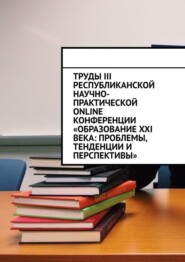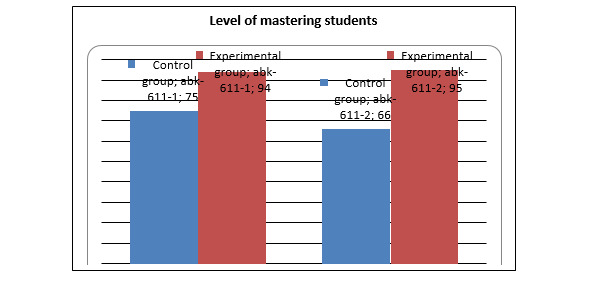
Полная версия:
Труды III Республиканской научно-практической online-конференции «Образование XXI века: проблемы, тенденции и перспективы»
Analysis
When performing laboratory work, an individual independent performance by each student of all the elements of the task is achieved, this cannot be achieved during the performance of laboratory work at the experimental stand. Below is a diagram to determine the level of knowledge of students in experimental and control groups:

The results of an experimental study of students obtained at one stand in a team are not always processed by each student personally. Individual students were creative in developing calculations for their options, presenting results, showed the ability to analyze and draw the right conclusions and make rational suggestions.
The most theoretically trained and computer technology-savvy students have shown ingenuity in presenting the results of the work done, both graphically and analytically.
All of this, plus the learning outcomes, led to the following conclusions:
1. Indeed, in the case of project-modular education, each student is involved in an active and effective teaching and cognitive activity, working with a program differentiated by content and dose;
2. Here is the individualization of control, self-control, correction, counseling, the degree of independence;
3. This training system guarantees each student the development of the standard of education and promotion to a higher level of education.
Thus, the use of project-module training in independent work on solving problems of a creative nature, i.e. with the hidden composition of the initial data allows students to discover new knowledge and phenomena (this element of novelty is fundamentally new for students, which is new to science and technology). Conditions for the development of each student participating in the project are created.
In order to successfully conduct a class on analyzing a practical situation, students should be given lectures, seminars and practical classes on topics that will be covered in the process of resolving the situation. It is desirable that students can use teaching materials on these topics. Moreover, it is not necessary that all topics be completed and completed.
Design-modular training has a clearly defined professional orientation. It is of interest to students in the subject «Programming» and to their future specialty.
This suggests that the application of the project method in academic work is very effective for organizing independent work of students and brings good results.
Conclusion
Let us first analyze the value of project training for a student. Students answer this question: the main thing is that everyone works independently, they are given the opportunity to get advice from the teacher, help from a friend, the learning content is much more fully understood, you can control yourself all the time.
This training system guarantees each student the development of the standard of education and promotion to a higher level of education.
Thus, the use of the project-modular method in independent work on solving problems of a creative nature, i.e. with the hidden composition of the initial data allows students to discover new knowledge and phenomena (this element of novelty is fundamentally new for students, which is new to science and technology). Conditions for the development of each student participating in the project are created.
Project training has a clearly defined professional orientation. It arouses the interest of students in the subject of «Programming» and in their future specialty.
This suggests that the application of the project method in academic work is very effective for organizing independent work of students and brings good results.
References
– The State Program for the Development of Education of the Republic of Kazakhstan for 2011—2020. // www.edu.gov.kz
– Castillo, E. J. A., Estrada, L. G., & Senti, V. E. (2015).Domain knowledge representation for programming teaching IEEE. Latin America Transactions, 13 (5), 1528—1533.
– Shaprova G.G. «Didactic basis for constructing a course of computer graphics as an independent discipline» Almaty, Abstract, 2010.
– Gao, W., Farahani, M. R., Aslam, A., & Hosamani, S. (2017). Distance learning techniques for ontology similarity measuring and ontology mapping. Cluster Computing-The Journal of Networks Software Tools and Applications, 20 (2SI), 959—968.
– Azarov R.N. Approaches to the organization of innovation in the university as a condition for improving the quality of education (for example, a regional university) // Economics, statistics and computer science. – 2011. – №2. – p. 3—8.
– Antyukhov A.V. Project training in higher education: problems and prospects // Higher education in Russia. – 2010. – №10. – p. 26—29.
– Atlasova A.D. The use of case-technology in the educational process // Remote and virtual learning. – 2010. – №10. – pp. 105- 112.
– Baranova N.V. Organization of independent work of students using computer technology // Distance and virtual learning. – 2011. – №1. – p. 48—53.
– Vishnyakova I.V. Training of engineers using new technologies // Higher education today. – 2011. – №5. – p. 17—19.
– Voronov M.V. Vocational training of students on the basis of integrated courses // Innovations in education. – 2011. – №9. – p. 4—15.
– Grigoriev O.V. Modern learning technologies // Innovations in education. – 2011. – №7. – pp. 17—25.
– Efremova O.N. Organization of independent work of students of a technical university as a means of forming professional skills // Higher education today. – 2011. – №4. – pp. 74—76.
Баялы Ә. Т., Жаксылыкова А.
Профессиональная подготовка будущих инженеров в условии информатизации образования
(Международный казахско-турецский университет имени Х.А.Ясави, г. Туркестан)
Аннотация
В статье рассматривается что преподаватель модульной технологии обучения в присутствии самостоятельной работы студента и окончательных результатах высвобождаемых непосредственного контроля исследования педагогического образования, анализ и опыта, относится к процессу развития системы образования в будущем. Texнология обучения, такие как многоцелевая система образования, обучение, дидактические элементы этой системы, в соответствии с принципами управления необходимо описать все связи между реальными структурами. Самопоглощение работы определяется степенью задач управления. Проверьте самостоятельную работу студента будет средневзвешенное от сложности задачи. Задачи, которые будут проанализированы на уровне гуманистического образования характера является одной из основных частей конструкции. Подготовка предмета адаптации молодежи к новым экономическим условиям, рыночных отношений – одна из основных социальных потребностей сегодня.
Введение
Исследуя современные тенденции развития мирового общества, учёные приходят к выводу, что его уровень определяется сегодня, главным образом, уровнем интеллектуализации его членов, их способностью производить, усваивать и использовать на практике новые знания и технологии. Однако, будущему специалисту необходимы не только прочные знания по изучаемым дисциплинам, но и умения оперативно реагировать на запросы динамично изменяющейся действительности. Основная задача дидактики в настоящее время заключается не только в том, чтобы сообщать студентам определенный объем знаний, но и наделять их готовностью и способностью самостоятельно действовать при решении возникающей проблемы, используя имеющийся объем информации и приобретенные знания, то есть готовить не только квалифицированного, но и компетентного специалиста.
Проблема
Изучение ГОСО стандарта по инженерным специальностям, таким как 5B070400-«Вычислительная техника и программное обеспечение» в Международного казахско-турецкого университета имени Х. А. Ясави показало, что надо рассмотреть основные закономерности, действующие в системе образования, а также для отдельных учебных дисциплин который увеличивает скорость выполнения работ.
Конец ознакомительного фрагмента.
Текст предоставлен ООО «ЛитРес».
Прочитайте эту книгу целиком, купив полную легальную версию на ЛитРес.
Безопасно оплатить книгу можно банковской картой Visa, MasterCard, Maestro, со счета мобильного телефона, с платежного терминала, в салоне МТС или Связной, через PayPal, WebMoney, Яндекс.Деньги, QIWI Кошелек, бонусными картами или другим удобным Вам способом.
Вы ознакомились с фрагментом книги.
Для бесплатного чтения открыта только часть текста.
Приобретайте полный текст книги у нашего партнера:
Полная версия книги
Всего 10 форматов

